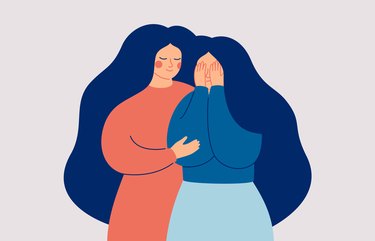
Some people stay stoic in every situation, while for others, a commercial for diapers or dog food can turn on the waterworks. If you're part of the latter group, you might sometimes find yourself wondering: Why do I cry so easily?
There's generally not a right or wrong amount to cry, says Chicago-based licensed clinical health psychologist Melissa Geraghty, PsyD. And in fact, shedding some tears can be a good thing: When you cry, your body releases feel-good hormones that actually help you feel better.
Video of the Day
Video of the Day
"Crying can be very therapeutic. Some people say after a good cry they're able to better deal with an issue and then move forward," Geraghty explains.
In other words? There's usually nothing wrong with being a big crier.
What's more, a number of different factors can affect the frequency with which you start sobbing. Here are some of the most common ones, plus how to turn off the tears when you really need to.
1. Personality
Certain personality types seem more prone to easy weeping than others.
Perhaps unsurprisingly, people who are highly empathetic (aka highly sensitive people) tend to cry more often. Those with a tendency toward neuroticism — who are often anxious or full of self-doubt — also are more likely to be bigger weepers, found a July 2016 study in Emotion Review.
2. Past and Present Experiences
Your childhood environment can have a big influence on how often you cry. Growing up in a household where crying or talking about your feelings was off-limits, for example, might actually make you more prone to easy tears as an adult.
"Your emotions might come through as tears more often because you may not have the vocabulary to express sadness or frustration," Geraghty says.
Frequent or unexpected crying can also happen if you feel like you're carrying a lot of emotional baggage from past situations. If you have a history of medical gaslighting from multiple health care providers, for instance, you might find yourself crying after meeting with a doctor who seems to take your concerns seriously, says Geraghty.
3. Cultural Background
Certain cultures encourage more freedom of expression than others.
Some research shows that people in wealthier countries tend to cry more often because their culture is OK with it. On the other hand, those living in poorer countries stay more buttoned up because showing emotions is more likely to be discouraged, according to the American Psychological Association (APA).
4. Gender
Women cry up to two to four times more often than men, according to the 2016 Emotion Review study. (We don't believe gender is binary here at LIVESTRONG.com, but for the sake of accurate reporting, we've stuck to the gendered language used by the study researchers.)
"It's more socially acceptable to for women to cry, so they don't feel like they need to mask their emotions as much," Geraghty says.
Some experts theorize women may also cry more often because they're more likely to experience interpersonal trauma or feelings of depression.
Hormones play a role too. The male hormone testosterone seems to inhibit crying, while higher levels of the hormone prolactin, found in women, tends to turn on the waterworks, per the APA.
Then there are the significant hormone shifts that come with things like PMS or pregnancy, Geraghty points out. If you've ever, say, welled up while waiting in line at the supermarket a few days before your period, you know how real this can be.
5. Stress Level
Some people snap into a rage at the slightest problem when they're unusually stressed or exhausted. Others will start crying over things that wouldn't normally be a big deal, like accidentally dropping a glass or plate or realizing that you forgot to buy coffee filters.
"What happens is, your baseline gets altered," Geraghty says. "If you have stress, when anything happens, even if it's minor, it can trigger your emotions to come stronger, faster and harder."
How to Stop Crying When You Need To
Crying can be a healthy response to a wide range of situations. But it can be helpful to know how to stanch the tears when you'd rather not be seen sobbing (like at work, for example, or when you're angry and in the middle of an argument with your partner).
- When you feel yourself starting to choke up, focus on what's happening around you instead of what's going on inside your head. "Look around and think of five things you can hear, four things you can see, three things you can touch, two things you can smell and one thing you can taste," Geraghty recommends.
- If you're giving an emotional speech or speaking at a funeral service, prepping beforehand can also help, she adds. Practice what you're going to say out loud in front of a mirror so you're mentally prepared to talk about the subject. Take slow, deep breaths when it's time to talk.
When to Seek Help
There's nothing wrong with being an easy crier. But you should talk with a mental health professional if your tears are tied to feelings of depression or if crying is interfering with your day, Geraghty says.
In rare instances, frequent crying for no reason could also be a sign of a brain tumor.
"When crying is accompanied by personality changes, it should be evaluated by a doctor," Geraghty recommends.
Was this article helpful?
150 Characters Max
0/150
Thank you for sharing!
Thank you for your feedback!
Is this an emergency? If you are experiencing serious medical symptoms, please see the National Library of Medicine’s list of signs you need emergency medical attention or call 911.